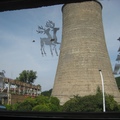| Untrendy places | ||||
| Noémi Kiss: The Tattered Jewel Box | ||||
|
||||
|
’A travel biography’ might be the coinage that best describes the genre of this curious little book, The Tattered Jewel Box, which tracks the narrow path of essayistic writing through the bushes of guide book, travelogue and the short story. The young authoress has a unique mind, very curious and daring, yet modest; pretty, naughty, proud and at the same time full of anxiety. Ever since the outset of her career Noémi Kiss has been known as someone who is equally familiar with the short story, the learned paper, the travelogue, critical writing and the essay and has mixed them fearlessly. She can afford to – she has the talent. Her style and rhythm, though still maturing, boiled down early and she upholds its unique qualities uncompromisingly. Norms of genre and approach are ignored, she looks around with her own eyes (spectacles) and speaks her own living language with its surprisingly vigorous and playful grammar. She is sufficiently disrespectful, a free soul but never arrogant – not the one to know more than the other person or the story that a village or a hill have to tell. She does not judge, nor ‘survey’ from above – instead of poising on any sort of intellectual pinnacle, she is up to her neck in the whirl of it all – in fact, makes it worse. Although thoroughly intellectual, she is not inclined to intellectualizing, while her remarks are intelligent and witty. This is an original spirit, sometimes piqued, often funny, always intelligent and feminine, ready to blush, ready to pale.
What is particularly welcome about her writing is that at last here is someone who, instead of musing over the wonders of Berlin, London and New York, takes the trouble to visit godforsaken parts of Eastern Europe such as Bukovina, Galicia or Backa – places in Romania, Ukraine or Serbia. This is what she is intrigued by. The tattered jewel box rather than the glamorous one, in which precious and semi-precious stones mingle with bijoux; true pearls with flitters and sand. The box also holds some tiny blue EU flags, the kind that the ice cream man sticks into your ices. This jewel box is muddy and dusty, like one found in some old attic or trodden in the mud by the wayside. What drives an authoress in her thirties on journeys of this kind? Her past and her remembrance. Noémi Kiss was born in the town of Gödöllő (close to Budapest) and had her share of the end of socialism and its realism, too. The early part of the travel biography describes her childhood and her grandmother, a schoolteacher. She describes her English education, which also gives a clear idea of her motivation. "With a Hungarian childhood it is easy to travel to Romania", she says and helps us discover our ‘poor relatives’ in Eastern Europe whom we would gladly forget, and our own tattered, battered identity which we would willingly swap for a new one. This kind of remembrance and vista is entirely untrendy today, at least László Végel from Novi Sad sadly points out that Central and Eastern Europe is not interesting any longer, because after the changes it has remained what it was, backward, aggressive and hostile. Another author from Vojvodina, Sándor Hódi says “what we call ‘integration’ and ‘bringing the regions up to standard’ is nothing other that the ultimate destruction of this part of the world". Noémi Kiss is not one to shed tears for the recent or the distant past, its rural or bourgeois traditions, nor do we find her amongst the liberal or nationalist political analysts of the post-communist transition. She does not grieve over the loss of national traditions, since she finds the area also laden with ‘false truths’, but she is also quick to spot the flipside of the new blue cult of Europe. She thinks not in terms of national boundaries and cultures but of regions and multi-culturalism. At the same time she is sensitive to various forms of oppression that affected and still affect national and other minorities, to the forced evacuation of ethnic populations based on false promises, to the multiple changes of place names and languages and looks with empathy on people deprived of home and means. She feels solidarity with deprivation of any sort, with the unemployed and the poor as well as the emotional wretchedness of the nouveau riche – generally, she is sensitive to raptures, fractures, slippages of all sorts. Nor is she without her stumbles. Noémi Kiss knows that our past, whether personal, national or of the closer ‘homeland’, is coated in lies. This might even be what all the past is made of. "Ugly, distorted, false memories. Chaos. It would be a lie to make any claims about them." Kiss struggles against platitudes and false claims while she is well aware that it is impossible to get the little fragments of truth quite clean. Nor is it necessarily the aim – they are true enough as they are, tattered. This is why she often chooses the crossroads of contradictions and is not bothered if she finds someone or something both lovely and ugly at the same time, glorious and stinky, sublime and depressing all at once. It is not her job as a writer to tidy up, in fact, she often makes things more untidy, disheveled. She exaggerates the mess but because she is a good writer with a style and technique of her own, something always comes out of this which begins to glow and the tattered, dusty little worlds start to shine. There are all sorts of things in this tattered jewel box other than true pearls, and the pieces are connected by Noémi Kiss’s style, the young writer’s excitable and disobedient spirit. Unfit for snobs, her work should only be read by those who can stand the smell of poverty, are not judgmental about bad taste and have not forgotten where they came from. Viktória Radics Noémi Kiss: Rongyos ékszerdoboz
Magvető, Budapest, 2009.
Previously on HLO
|
untrendly placec
2010.03.09. 09:23 | pillangóutcácska | Szólj hozzá!
A bejegyzés trackback címe:
https://kissnoemi.blog.hu/api/trackback/id/tr1005409697
Kommentek:
A hozzászólások a vonatkozó jogszabályok értelmében felhasználói tartalomnak minősülnek, értük a szolgáltatás technikai üzemeltetője semmilyen felelősséget nem vállal, azokat nem ellenőrzi. Kifogás esetén forduljon a blog szerkesztőjéhez. Részletek a Felhasználási feltételekben és az adatvédelmi tájékoztatóban.
Nincsenek hozzászólások.






